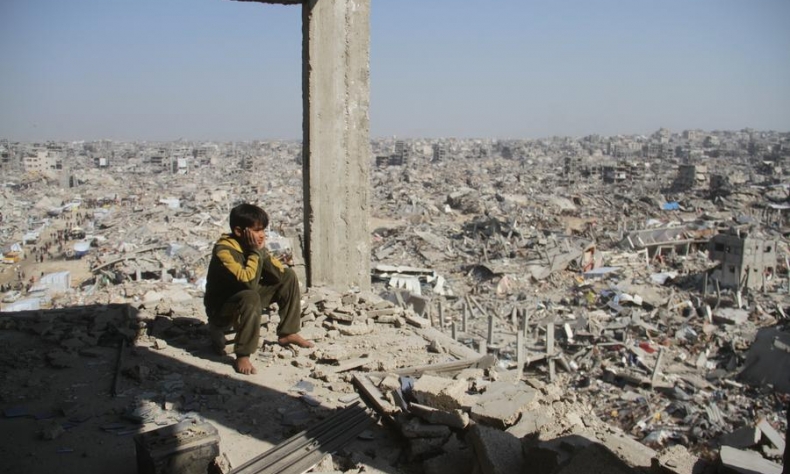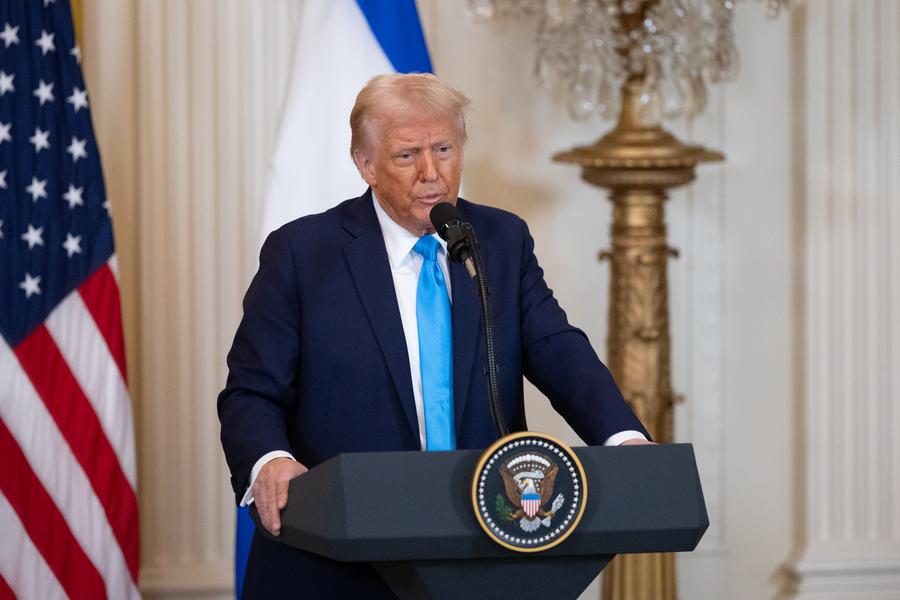Trump’s Gaza Plan Draws Wide Criticism

Gaza is an inalienable part of the territory of Palestine, not a bargaining chip for political games, still less prey for the strong.
In yet another controversial move, U.S. President Donald Trump has once again announced his intention to acquire foreign territory—this time, the Gaza Strip.
After previously announcing plans to take over Greenland, Canada and the Panama Canal, Trump said during a joint press conference with visiting Israeli Prime Minister Benjamin Netanyahu in Washington, D.C. on February 4 that the United States will “take control of the Gaza Strip,” relocate its Palestinian residents to neighboring countries, and redevelop the coastal enclave, much of which has been reduced to rubble after 15 months of war between Israel and the Palestinian Islamic Resistance Movement (Hamas).
Israeli airstrikes have damaged or destroyed around 60 percent of buildings, including schools and hospitals, and around 92 percent of homes, according to the United Nations.
On February 9, Trump said that he is “committed to buying and owning Gaza,” and that the U.S. may let other countries in the Middle East rebuild the war-torn strip.
His remarks have sparked global outrage, with critics warning that forced displacement on such a scale could violate international law. While voicing their opposition, many around the world also emphasize the importance of a two-state solution—which envisages independent Israeli and Palestinian states peacefully coexisting, to resolve the ongoing Palestinian-Israeli conflict—as the path to lasting peace in the region.
Widespread criticism
In its coverage, the BBC emphasized that Trump’s plan “will be seen as flying in face of international law,” while CNN called it “the most outlandish idea in the history of U.S. Middle East peacemaking.”
The British newspaper Guardian viewed Trump’s remarks as an indication that he is incorporating Gaza into his expansionist agenda, adding that this proposal aligns with the aspirations of Israel’s far-right and contradicts former U.S. President Joe Biden’s commitment to opposing the mass expulsion of Palestinians.
“If the Trump administration and Israel truly push forward with such a plan in a hardline manner, it would essentially mean that the U.S. is assisting Israel in annexing the Gaza Strip,” Sun Degang, Director of the Center for Middle Eastern Studies at the Shanghai-based Fudan University, told news portal ThePaper.cn. “Such a move would provoke opposition from the entire Arab and Islamic world, and it would be unacceptable to the international community and the United Nations.”

UN Secretary General António Guterres warned against any form of ethnic cleansing in Gaza at a UN meeting on February 5, underscoring that forced displacement violates international law.
Despite Trump’s claim to take over Gaza, UN humanitarian personnel continue to deliver aid to Gaza, with operations scaled up to support the most vulnerable, including those displaced by the ongoing conflict.
In response to Trump’s remarks, the Chinese Foreign Ministry said Gaza is an inalienable part of the territory of Palestine, not a bargaining chip for political games, still less prey for the strong.
“The war has already left Gaza in devastation and suffering. The international community, major countries in particular, should join hands to make Gaza better, rather than worse, by providing humanitarian assistance and helping with its reconstruction,” foreign ministry spokesperson Guo Jiakun said on February 6.
“The European Union remains firmly committed to a two-state solution, which we believe is the only path to long-term peace for both Israelis and Palestinians,” Anouar El Anouni, the EU’s spokesperson for foreign affairs and security policy, said on February 5. “Gaza is an integral part of a future Palestinian state.”
According to his office, French President Emmanuel Macron held a phone conversation on February 5 with his Egyptian counterpart Abdel-Fattah al-Sisi, both firmly agreeing “any forced displacement of the Palestinian population in Gaza or the West Bank would be unacceptable,” and pointing out that it would be a serious violation of international law and an obstacle to the two-state solution.
The Arab League rejected Trump’s proposal in a statement, saying it violates international law and threatens regional stability. It “does not contribute to achieving the two-state solution, which represents the only way to bring peace and security between Palestinians and Israelis, and in the entire region.”
The Saudi Foreign Ministry also issued a statement reaffirming that Saudi Arabia’s position in favor of the establishment of a Palestinian state is non-negotiable.
Gaza is an integral part of the occupied Palestinian territory, not property that can be bought or sold, Hamas said on February 10. “Our Palestinian people will thwart all displacement and deportation plans,” Izzat al-Rishq, a member of the political bureau of Hamas, said in a statement.
“Gaza belongs to its people,” the statement stressed.

Multiple motives
Undoubtedly, this new approach by Trump would open a “Pandora’s box,” Li Zixin, a researcher on Middle East politics and security at the China Institute of International Studies, told Beijing Review. “The plan has the potential to intensify conflicts and increase non-traditional security risks for local communities,” he warned.
Trump’s words often need to be taken with several pinches of salt. He aimed to negate the Middle East policy of his predecessor Biden by proposing solutions that are fundamentally different, Liu Zhongmin, a professor at the Middle East Studies Institute of Shanghai International Studies University, told Xinhua News Agency.
The Biden administration, on one hand, supported Israel, which has drew criticism from Palestine and the international community, while on the other hand, it hesitated to fully satisfy Israel’s demands, leaving Israel dissatisfied and rendering the U.S. influence over Israel on ceasefire issues weak and awkward, Liu explained, adding that by offering an entirely new approach, Trump wants to prove himself a more effective mediator of Middle East conflict than Biden.
Employing a strategy of “asking for the sky” to create bargaining chips and pressure the other side into making concessions is a negotiation tactic frequently used by Trump, Niu Xinchun, Executive Director of the China-Arab Research Institute at Ningxia University, said to Xinhua. As contact and negotiations regarding the second phase of the ceasefire have already begun, with subsequent talks expected to involve post-war governance and reconstruction, Trump’s proposal to “take over Gaza” this time may be intended to exert pressure on Palestine and neighboring countries, he added.
Trump’s remarks reveal that the current U.S. Government lacks a clear policy toward the Middle East, Sun said, adding “however, at its core, the policy remains focused on safeguarding Israel’s security interests and addressing the concerns of the Israeli Government.”
“The primary goal of Trump’s statement is to secure Israel as a key ally in the region and to unconditionally support its efforts to expand its strategic space,” Sun said.
Trump’s new proposal, in reality, is consistent with his longstanding strategy toward the Middle East, Liu said. During his first term, Trump introduced the so-called “Deal of the Century,” or “Peace to Prosperity” plan, which essentially aimed to offer Palestinians certain economic benefits in exchange for concessions on territorial issues, thereby normalizing relations between Israel and Arab countries, creating a relatively stable Middle East framework favorable to Israel, and ultimately serving the U.S. global strategy.
This time, Trump has also claimed he will “redevelop” the Gaza Strip, proposing to provide Palestinians with economic benefits such as housing and employment, but on the condition that they leave first. This might be a tactic to pave the way for his “Deal of the Century,” Liu added.
 Facebook
Facebook
 Twitter
Twitter
 Linkedin
Linkedin
 Google +
Google +










